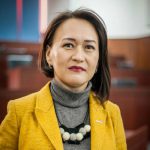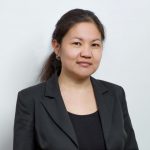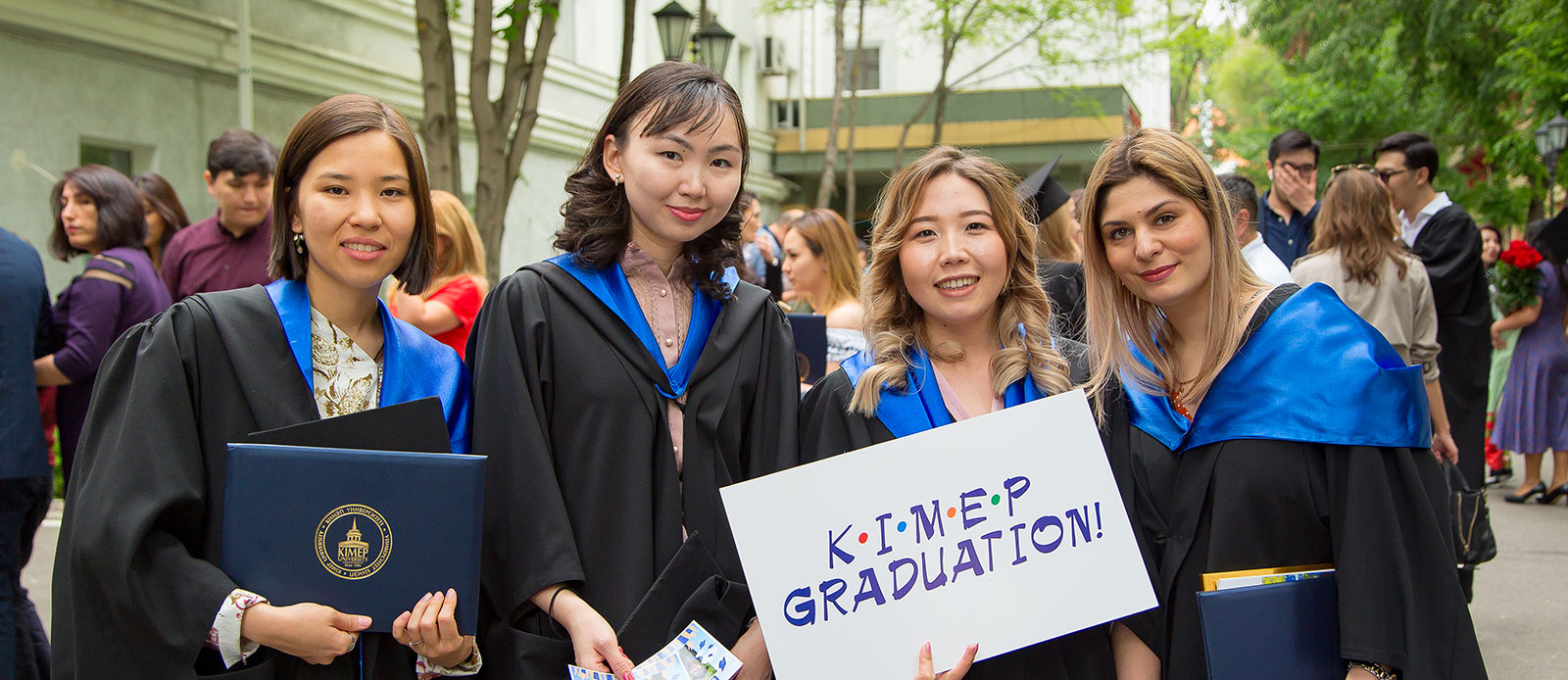The KIMEP University’s Master of Arts in Foreign Languages: Two Foreign Languages program trains students to become highly qualified and professional teachers. This profession is in high demand not only in Kazakhstan but also around the world.
This program is based on concepts of applied and educational linguistics, giving the teachers the skills necessary to resolve the challenges that 21st-century pedagogues face. Courses emphasize theory, practice, and research so that students can develop a holistic understanding of issues related to languages and education. The principles of learning presented in the program may be applied to teaching any language. This approach also prepares the students for activities in the spheres of education, educational policy, program development, administration and translation/interpretation.
This graduate program emphasizes teaching English to multilingual learners.
The program gives its students the unique opportunity to obtain a high-quality education from teachers with extensive international experience. It also boasts with unrivaled opportunities for research and teaching practice.
- The program is accredited by a European accrediting agency.
- All teachers at the College of Humanities and Education have post-graduate degrees from foreign universities and are research active.
- Evening and weekend classes that allow you to continue working while you study.
- The program can be completed in one year.
Degree Requirements
Requirements for the MA in Foreign Language are as follows:
| Discipline module | Credits | ECTS | |
| 1. | Theoretical education | 37 | 84 |
| 1.1 | Program Foundation Requirements | 19 | 35 |
| 1) | Required Courses | 10 | 20 |
| 2) | Elective Courses | 9 | 15 |
| 1.2 | Program Specialization Requirements | 18 | 49 |
| 1) | Required Courses | 14 | 23 |
| 2) | Elective Courses | 3 | 5 |
| 3) | Research Internship | 1 | 21 |
| 2. | Research Component | 8 | 24 |
| 3. | Final Attestation | 3 | 12 |
| Total Required for Graduation | 48 | 120 |
Program Foundation Requirements
Required Courses
| Course Code | Course Title | Credits | ECTS |
| TFL5401.1 | Methods in Language Teaching: (Foreign language professional) |
1 |
5 |
| TFL5401.2 | Methods in Language Teaching: (Psychology) | 1 | |
| TFL5401.3 | Methods in Language Teaching: (Management) | 1 | |
| TFL5601 | Research Methods (History and Philosophy of Science) | 3 | 5 |
| TFL5402B | Practicum (Pedagogical Internship) | 4 | 10 |
| TOTAL | 10 | 20 |
Elective courses
| Course Code | Course Title | Credits | ECTS |
| TFL5101 | Introduction to Linguistics (Research History and Philosophy) |
3 | 5 |
| TFL5404 | Language Evaluation and Assessments | 3 | 5 |
| TFL5102 | Introduction to Sociolinguistics | 3 | 5 |
| TFL5506 | Cross-cultural Aspects of Language Teaching | 3 | 5 |
| TOTAL | 9 | 15 |
2. Program Specialization Requirements
Required Courses
| Course Code | Course Title | Credits | ECTS |
| TFL5301 | Introduction to Second Language Acquisition | 3 | 5 |
| TFL5201 | Language Analysis for Language Instructors: Formal and Functional Grammars (Foreign language professional) |
3 | 5 |
| TFL5202 | Language Analysis for Language Instructors: Grammar in Social, Cultural Contexts (Foreign language professional) |
3 | 5 |
| TFL5402A | Practicum | 2 | 3 |
| TFL5403 | Curriculum and Materials Design | 3 | 5 |
| TOTAL | 14 | 23 |
Elective Courses
| TFL5501 | Multilingualism | 3 | 5 |
| TFL5502 | Educational Technology in Language Classroom | 3 | 5 |
| TOTAL | 3 | 5 |
Research Internship
| TFL54xx | Research Internship | 1 | 21 |
3 Research Component
| Course Code | Course Title | Credits | ECTS |
| TFL5690 | Thesis I (Including Field Research – Data Collection: research apprenticeship) | 3 | 16 |
| TFL5504 | Introduction to Program Evaluation | 3 | 5 |
| TFL5700 | Seminar in Applied Linguistics | 2 | 3 |
| TOTAL | 8 | 24 |
4. Final Attestation
| Course Code | Course Title | Credits | ECTS |
| TFL5691 | Thesis II | 3 | 12 |
| TOTAL | 3 | 12 |
Program Plan
The following tables are a sample program of study to finish the MA in Foreign Language degree in two years.
| 1st Year | Fall Semester | Cr | ECTS | 1st Year | Spring Semester | Cr | ECTS |
| TFL5101 | Introduction to Linguistics | 3 | 5 | TFL5102 | Introduction to Sociolinguistics | 3 | 5 |
| TFL5301 | Introduction to SLA | 3 | 5 | TFL5302 TFL5403 |
Second Language Acquisition Research Curriculum and Materials Design |
3 3 |
5 5 |
| TFL5401 | Methods in Language Teaching | 3 | 5 | TFL5202 | Language Analysis for Language Instructors: Grammar in Social, Cultural Contexts |
3 | 5 |
| TFL5201 | Language Analysis for Language Instructors: Formal and Functional Grammars |
3 | 5 | TFL550x | Elective | 3 | 5 |
| Total | 12 | 20 | Total | 15 | 25 |
| 1st Year | Summer Semester | Cr | ECTS | ||||
| Research Internship | 1 | 21 |
| 2nd Year | Fall Semester | Cr | ECTS | 2nd Year | Spring Semester | Cr | ECTS |
| TFL5404 | Language Evaluation and Assessment | 3 | 5 | TFL 5402b | Practicum (Student Teaching) | 4 | 10 |
| TFL 5402a | Practicum (Seminar) | 2 | 3 | TFL5691 | Thesis II | 3 | 12 |
| TFL5601 TFL5700 TFL5690 |
Research Methods Seminar in Applied Linguistics Thesis 1 |
3 2 3 |
5 3 16 |
||||
| Total | 13 | 32 | Total | 7 | 22 |
Total for program: 48 course credits (120 ECTS)
TFL5101 Introduction to Linguistics (cross-listed as TEL 5101) (3 credits)
Prerequisites: None
This course provides an overview to the general study of language. Introduction to Linguistics surveys linguistic theory focusing on subtopics of particular relevance to language teachers including: general phonetics, phonology, morphology, syntax, semantics, and historical-comparative linguistics. This course considers a universal grammar that governs language, and it also explores similarities and differences among languages. Other topics include language learning and the psychology of language; linguistic universals; and aspects of language in society. Topics covered will be exemplified through a variety of languages.
TFL5102 Introduction to Sociolinguistics (cross-listed as TEL 5102) (3 credits)
Prerequisites: TEL5101
This sociolinguistics course focuses on examining language as it is used in society and how language and society affect each other. It assumes that language is fundamental in the organization and understanding of everyday interactions, from both individual and societal perspectives. The course topics include social dialects; class, ethnic, and gender differences in speech; linguistic change; language in multinational settings; and the politics of language. The course also studies applications of sociolinguistic research methods to problems in applied linguistics and language education.
TFL5201 Language Analysis for Language Instructors: Formal and Functional Grammars (cross-listed as TEL 5201) (3 credits)
Co-requisites: TEL5101
This course is the first part of a two-course sequence. The course provides an overview of formal and functional perspectives using English language structure as the point of departure and focuses on English phonetics, phonology, morphology and syntax. The course surveys the role(s) of grammar in second/foreign language teaching, and presents strategies for introducing grammatical forms to non-native speakers.
TFL5202 Language Analysis for Language Instructors: Grammar in Social, Cultural Contexts (cross-listed as TEL 5202) (3 credits)
Prerequisites: TEL5101, TEL5201
This course is the second part of a two-course sequence. The course analyzes relations between situational contexts and grammatical choices, and refers to contemporary views about language semantics, pragmatics, and discourse structures. The course also considers implications of grammatical choices in situational contexts for foreign language instruction.
TFL5301 Introduction to Second Language Acquisition (cross-listed as TEL 5301) (3 credits)
Co-requisite: TEL5101
This course examines the process of acquiring a second or additional language. Topics include the nature of learner language, individual differences in language acquisition, the role of input and interaction, similarities and differences in L1 and L2 acquisition, instructed acquisition, and the relationship between acquisition research and second language teaching. The course also analyzes the neurolinguistic, psycholinguistic, and sociolinguistic bases of second language acquisition in childhood and adulthood.
TFL5302 Second Language Acquisition Research (cross-listed as TEL 5302) (3 credits)
Prerequisites: TEL5301
This course is an introduction to research on the language and learning processes of second-language learners. The goal of this course is to deepen students’ knowledge of cognitive and linguistic approaches to second language acquisition and to analyze research according to grammatical, pragmatic, and sociolinguistic dimensions of language learning. The course surveys major perspectives on second language acquisition processes, including interlanguage theory, the Monitor Model, acculturation theory, cognitive/connectionist theory, and linguistic universals. Course work shall consist of the planning and implementation of a research project and the exchange of the results of this research through discussion, reports, and/or papers.
TFL5401 Methods in Language Teaching (cross-listed as TEL 5401) (2 credits/3 credits)
Prerequisites: None
This course is an introduction to current instructional methods and approaches for teaching a second language to adults. The course focuses on theoretical perspectives, major methodological issues, and current controversies, and examines the historical and theoretical foundations in second language teaching. The course involves extensive readings, discussions, and observations of language classes, with consideration of principles for instruction in a wide range of teaching contexts. Particular attention is paid to long-term development of language teachers as decision-makers and problem-solvers.
TFL5402a Practicum (cross-listed as TEL 5402a) (2 credits)
Prerequisites: TFL5401; can be taken concurrently with TFL5402b; a minimum of 18 credits in the program
The practicum is a course in which the student demonstrates the knowledge and skills developed in the master’s program. It is an observation of and practice in teaching second language to adults at the college or university level. Students are apprenticed to experienced mentor teachers in ongoing language classes, and receive detailed feedback on their teaching, including comments about the knowledge, principles, and skills required to teach second languages; performance with language curriculum and materials development; and use of student assessment. For experienced teachers, especially those who have taught for many years in ESL and multilingual settings, a research project is an option.
TFL5402b Practicum (cross-listed as TEL 5402b) (4 credits)
Prerequisites: TEL5401; TFL5402b can be taken concurrently with TEL5402a; a minimum of 18 credits in the program
The second part of the practicum is the in-class, student teaching experience, where the knowledge and skills developed in the program is applied. TEL5402b can be waived for teachers who are working full-time.
TFL5403 Curriculum Design and Classroom Management (cross-listed as TEL 5403) (2 credits)
Prerequisites: None
This course prepares and evaluates materials for teaching second language in a variety of contexts. The course focuses on learning-centered approaches to designing courses, from developing curriculum to material design. Curricula in both second and foreign language environments will be addressed. During the course, students will design a curriculum to respond to the needs of a specific student audience through a process of needs assessment, selection, sequencing, presentation, and evaluation. Students will select, adapt, develop, and evaluate course goals and objectives, structured syllabus, course units, lesson plans, system of evaluation, and materials for one lesson.
TFL5404 Language Evaluation and Assessment (cross-listed as TEL 5404) (2 credits/3 credits)
Prerequisites: A minimum of 18 credits in the program
This course introduces the principles and practice of conducting language learning evaluation within the context of adult foreign language acquisition from both theoretical and practical perspectives. The course is aimed at analysis of the goals and rationale of different types of assessments in foreign language programs, including teacher-made assessments and current standardized test instruments. Students will also gain experience in developing and critiquing assessment materials.
TFL5501 English for Specific Purposes (cross-listed as TEL 5501) (2 credits)
Prerequisites: None
This course is a critical review of literature on genres of English used in identified social contexts, such as the language used in academic journal articles or during job interviews. Students carry out their own ESP research projects, describing the way English is used in a target context.
TFL5502 Educational Technology in Language Classrooms (cross-listed as TEL 5502) (2 credits)
Prerequisites: None
This course explores the uses of computers in the foreign language classroom, including language learning through information processing software, digital technology, multimedia applications for home-oriented and educational software, and the Internet. During the course students will have hands-on experience with multimedia applications and instructional software, information processing software, and digital technology.
TFL5503 Teaching Writing and Reading (cross-listed as TEL 5503) (2 credits)
Prerequisites: None
This course examines language reading-writing theory and pedagogy focusing on adult EFL/ESL classrooms. Readings and discussions address intellectual and analytical procedures involved in writing and reading, social and political contexts within which second language writing/reading occurs, etc. Students explore second and foreign language reading and writing development and examine effective teaching by designing methods and materials for teaching reading and writing and evaluating phonological, semantic, and syntactic aspects of instruction.
TFL5504 Teaching Listening and Speaking (cross-listed as TEL 5504) (2 credits)
Prerequisites: None
This course examines foreign and second language listening/speaking theory and pedagogy in adult classrooms. It explores the process of listening and comprehension, and highlights problems faced by non-native speakers. The course also surveys the methods, techniques, and activities for teaching conversation and listening comprehension, with an examination of recently published materials. Lesson planning and effective classroom management appropriate to the needs of students are emphasized.
TFL5506 Cross-Cultural Aspects of Language Teaching (cross-listed as TEL 5506) (2 credits)
Prerequisites: None
This course defines and explores the relationship between language teaching and culture with a heavy emphasis on how to use different approaches (literature, writing, media, theatre, history) to teach culture through language courses starting with the basic question of what is culture? This course is grounded in a socio-cultural constructivist approach towards language and language learning. Students will study culture in general and learn about their own cultural influences to better understand teacher-student and student-student interactions from various cultures through and in language teaching.
TFL5601 Research Methods and Graduate Research Writing (cross-listed as TEL 5601) (3 credits)
Prerequisites: TFL5302; a minimum of 18 credits in the program
This course is designed to familiarize students with a variety of scholarly and scientific approaches and methods for research in education settings, theory development, data processing, scholarly writing, and organization of a research paper related to applied linguistics, second language acquisition, and pedagogy.
TFL5690 Thesis I (3 credits)
Prerequisites: TEL5601; a minimum of 18 credits in the program
Students register for this course and TEL5691 while they are working on and defending their master’s thesis.
TFL5691 Thesis II (3 credits)
Prerequisites: TEL5690 (or concurrent enrollment); a minimum of 22 credits in the program
This is the second course for working on and defending the master’s thesis.
TFL5692 Comprehensive Examination Preparation Course (1 credit)
Prerequisites: Must have completed all coursework in the program except TFL 5690 and TFL 5691 (Thesis I and II).
This course prepares students for the Kazakhstani state-issued comprehensive exam for the Foreign Language: Two Foreign Languages degree.
TFL5700 Seminar in Applied Linguistics (cross-listed as TEL 5700) (2 credits)
Prerequisites: None
This is a special topics seminar that will focus on various contemporary issues in language acquisition and teaching. Seminar topics include (but are not limited to): bilingualism, language policy and planning, discourse analysis, program evaluation, and critical pedagogy. Seminar topics will be listed on the program website during the registration period preceding the semester.
and translation organizations. All our graduates are employed or continue with their Ph.D. programs abroad.

Juldyz Smagulova, PhD
Associate Professor, Dean
More:
Ph.D. in Sociolinguistics
Dr. Juldyz Smagulova received her Ph.D. in Sociolinguistics from King’s College London (2012, UK), her Candidate of Philological Sciences from al-Farabi Kazakh National University (2004, Kazakhstan), and her MA in Linguistics from the University of Minnesota (1999, USA).
Her research interests and expertise include language bilingualism, language socialization, interactional sociolinguistics, language education and teacher training, language policy and planning. She co-edited the Language Change in Central Asia (Mouton de Gruyter, 2016); and co-authored the bilingual Kazakh-Russian Dictionary of Sociolinguistics (Arman PV, Kazakhstan, 2008) and the Kazakh language textbook for Russian-medium schools (Grade 5, Atamura, 2015). She has articles published in Journal of Sociolinguistics, International Journal of Bilingualism, and International Journal of Bilingual Education and Bilingualism.
Dr. Smagulova teaches graduate courses Introduction to Second Language Acquisition, Second Language Acquisition Research, Introduction to Sociolinguistics, and Introduction to Bilingualism as well undergraduate Academic English courses. She provides consulting in the areas of language planning and policy and conducts trainings for language teachers.
Publications:
- Smagulova, J. (2017). Ideologies of language revival: Kazakh as school talk. International Journal of Bilingualism. Special issue “Ideology, agency, and imagination in multilingual families” edited by K. King and E. Lanza. DOI: https://doi.org/10.1177/13670069166849202015
- Smagulova, J. (2019). (adapted with Bekzhanova G., Tutbayeva Zh., Tutbayeva N. and Akisheva R.) English Sciences: Student’s Book. Grade 10. Cambridge University Press.
- Ahn, E. & Smagulova, J. (Eds.) (2016). Language change in Central Asia. Berlin, Germany: Mouton de Gruyter. [In the Contributions to the Sociology of Language series edited by Joshua Fishman].
- Ahn, E. & Smagulova, J. (Eds.) (2016). Examining education change in urban Kazakhstan: A short spatial story. In Silova, I. & Niyazov, S. (Eds.), Globalization on the margins: Education and post-socialist transformations in Central Asia (2nd ed.). Charlotte, NC: Information Age.
- Ahn, E., Bahry, S., Niyozov, S. , Shamatov, D. & Smagulova, J. (2016). Bilingual education in Central Asia. In O. García et al. (Eds.), Bilingual and multilingual education, encyclopedia of language and education, (3rd ed.) New York, NY: Springer International Publishing.
- Smagulova, J. & Yernazarova, Z. (2016). Teaching Kazakh literature in Kazakh to Russian speakers: Symbolic value or effective pedagogy? In Bakić-Mirić, N. & Gaipov, D. (Eds.), Going Forward: Recent developments in higher education (pp. 127-136). Newcastle upon Tyne: Cambridge Scholars Publishing.
Phone: +7 (727) 270 43 68, ext. 2112
Email: juldyz@kimep.kz
Address: 2 Abai Ave., Almaty, Kazakhstan, Dostyk Building, office #228

Karina Narymbetovа, CSc
Assistant Professor, Associate Dean
More:
CSc, Assistant Professor
LC Deputy Director
Karina Narymbetova received her Candidate of Philological Sciences from al-Farabi Kazakh National University (2009, Kazakhstan), and her MA in TESOL from KIMEP University (2016).
Her research interests are principally in the area of literary studies, language education, and teacher training. Her research on comparative literary studies was partly done under JFDP fellowship as a visiting scholar in 2004-2005 at the WSU and University of Washington, USA. She is a self-directed, action-oriented professional with over 20 years’ experience in education who has developed a diverse teaching and training record. As a British Council Researcher Connect Trainer she has worked in a training and consultancy capacity with teachers and researchers. She has made keynote and workshop presentations for many national and international conferences on various aspects of teaching & learning.
She teaches both undergraduate and graduate students and believes it is important to understand different learning styles and strengths that students bring to class. Her favorite part of teaching is searching for approaches to help struggling students to cope with challenging material.
Publications:
- Narymbetova, K. (2019, august). Elementary literacy program in Kazakhstan. Learning from the past for the future: Literacy for all. Copenhagen, Denmark.
- Babeshko, Y. & Narymbetova, K. (2019, august). Are you “instateacher”? Academic literacy through social network sites. Learning from the past for the future: Literacy for all. Copenhagen, Denmark.
- Narymbetova, K., Kulichenko Y. (2016). Literacy and Education: raising the intellectual potential of Kazakhstan. Symposium proceedings New trends in Science and Education. pp. 76-78
- Narymbetova, K, (2016). Literacy Assessment and Evaluation Practices in Kazakhstan: Teachers’ Perspective. Paper presented at the international conference 3rd Baltic – 17th Nordic Literacy Conference. Turku, Finland
- Narymbetova, K. (2016). Kazakhstan in the works of American writers. In Y.K. Kalizhanov (Eds), Kazakh-American Literary relations: Present and Future. pp. 82-115
- Narymbetova, K. (2016). American image in Kazakh literature. In Y.K. Kalizhanov (Eds), Kazakh-American Literary relations: Present and Future. pp. 116-138
- Narymbetova, K. (2016). Poetry of Kanapiyanov, Kenzheyev and Kodar in foreign publications. In Y.K. Kalizhanov (Eds), Kazakh-American Literary relations: Present and Future. pp. 212-231
- Narymbetova, K. (2017, April). Literacy assessment and evaluation practices in Kazakhstan: teachers’ perspective. Paper presented at the international conference “Governance and Communication: Between Modernity and Post-Modernity”, KIMEP. Almaty
Karina Narymbetova,
Senior Lecturer, CSc
LC Deputy Director
Language Center, KIMEP University
2, Abai Ave., 050010, Almaty
tel # 7 727 270-43-71, ext 2617
nkarina@kimep.kz

John Sedwick Westbrook , MFA, MA
Senior Lecturer
More:
John Westbrook holds an MFA in Creative Writing, with a concentration in poetry, from the University of Florida (2012, USA). He completed an MA in English at the University of Tulsa (2017, USA) and a BA in English at the Rice University (2009, USA).
His research interests include contemporary Anglophone poetry, poetry in translation, and creative writing pedagogy. He formerly served as assistant poetry editor for the American literary journal Subtropics and now serves as co-editor of KIMEP’s new humanities journal Language, Culture, Environment. His poems and translations have appeared in publications such as the Manchester Review, the New Criterion, and the Southern Review.
Mr. Westbrook teaches Academic Reading and Writing II and Introduction to Films.

Askat Tleuov
Assistant Professor
More:
PhD in Education
Dr Askat Tleuov received his PhD in Education from the University of Bath, UK in 2017. He has significant experience in English language teaching, working as an EFL teacher, lecturer, teacher educator and researcher in Kazakhstan and the United Kingdom.
Askat specializes in teacher cognition, teacher education, and teacher professional development. He has a particular interest in teacher knowledge, beliefs and perceptions; how these are enacted in practice; and the personal, educational and professional experiences which influence their development. Another strand of his research focuses on policy studies and politics of education. His recent research project involves the investigation of state and institution-wide research internationalization policies in Kazakhstan.
Dr Tleuov has been involved in teaching both undergraduate and graduate level courses that range from Academic English course to Introduction to Second Language Acquisition, Research Methods, and Learning Evaluation & Assessment in Language Education. He has supervised a number of Master level dissertations as well.

George Rueckert, PhD
Assistant Professor for English and Translation,
Director of Undergraduate and Graduate Programs
More:
PhD in Comparative Literature
(PhD University of Washington; MA Kansas State University; BA College of William & Mary)
Dr. George Rueckert is the Director of Undergraduate and Graduate Programs at the KIMEP Language Center and teaches all levels of English, as well as Russian-English translation. He earned his BA and MA degrees in English and his PhD in Comparative Literature, specializing in Russian and German. He worked for the European Union in Seattle USA and later taught English and translation in Germany before coming to Almaty in 2011.
His scholarly interests include translation and translation theory, semiotic and hermeneutic theory, verse translation and poetics, and 19th and 20th century literature and culture, particularly the Russian Romantic and Symbolist Periods, on which he has published several articles. He has also taught seminars on Cold War culture and extensively in TESOL. He is a working practical translator.
Dr. Rueckert regularly teaches graduate courses in Formal and Functional Grammar and in Grammar in Social Context, as well as undergraduate courses in Academic English, translation, and literature. He is married and has two small children.
Rueckert, George (2001). “A.A. Bestuzhev-Marlinsky and the Critical Theory of the Novel.” Nineteenth-Century Prose 28:1. 21-45.
Rueckert, George and Yuzefpolskaya, Sofiya (2006). “No Empty Game: Arsenij Tarkovskij’s Memorial Poems to N.A. Zabolotskij and A.A. Akhmatova.” Slavic and East European Journal 50.2. 274-309.
Rueckert, George (2008). “Translation as sentimental education: Zhukovskij’s Sel’skoe kladbishche.” Sign Systems Studies 36.2. 399-416.
Sagadiev, Kenzhegali (2012). Reforms in Kazakhstan: An Analytical View. Trans. Rueckert, George. Almaty: Business Media. ISBN: 978-601-7144-65-4.
Tarkovskii, Arsenii (2016). “Selected Poems.” Trans. Rueckert, George and Yuzefpolskaya, Sofiya. Bulletin of the Pushkin Society in America 1:2. 24-28.

Konstantinos Kristofer Dimitriou
Assistant Professor
More:
Assistant Professor
PhD in Education (University of Bath, UK), MSc Educational Research (University of Manchester), M.A. Teaching of English as a Foreign Language (University of Birmingham), Post-graduate Certificate in Learning and Teaching in Higher & Professional Education (Institute of Education, London)
Dr. Dimitriou has over twenty years of teaching experience in Academic Literacy and Applied Linguistics. His previous experience ranges from Queen Mary University of London to the European University Institute in Florence, Italy. His doctoral research investigation was on tertiary academic literacy processes. His present research is into gamification and intercultural communication. Konstantinos has previously studied and presented on the topics of bilingual language development, bilingual parenting, academic culture, feedback processes, tertiary student writing voice & critical writing, corpora in teaching, and academic plagiarism.
The range of graduate and undergraduate level courses which Dr. Dimitriou has taught include Research Methods, Thesis writing, Introduction to Second Language Acquisition Research and Writing for Law.

Maganat Shegebayev, MA TESOL
Associate Professor
More:
DBA
KIMEP University, Kazakhstan, Almaty (2012)
Dr. Shegebayev is an associate Professor of KIMEP Language Center. One of the Kazakhstan’s first-wave Bolashak International Scholarship awardees, he received a Master of Arts degree in TESOL from Fairfield University, USA; he then received a Doctor of Business Administration degree from KIMEP University. Dr. Shegebayev has had twenty years of teaching and administrative experience and has been distinguished with the awards for academic and service achievements. Three times in his pedagogical practice he has been awarded with the Certificate of Teaching Excellence.
In his activities, Dr. Shegebayev has served as a task force member to develop national program Intellectual Nation-2020 for the government of Kazakhstan. He has authored and co-authored a number of international publications; he has been involved in various educational and research projects across Kazakhstan and abroad, which include collaboration with Indiana University (Bloomington, IN), Institute Aminuddin Baki (Kuala Lumpur, Malaysia), George Washington University (Washington, D.C.), and Norwegian Institute of International Affairs (Oslo, Norway). His research interests include topics related to linguistics, language policy and planning, critical thinking, business communication and educational management.
The range of graduate and undergraduate level courses which Dr. Shegebayev has taught includes Academic English, Critical Thinking, Educational Technology, Business Correspondence and Communication, General & Business English, and Foundation English. He has also taught Business English certificate courses of the London Chamber of Commerce and Industry (LCCI English for Business, levels 1, 2 and 3) to corporate clients from Central Asian countries. As a part of the international teaching mobility, Dr. Shegebayev has been invited as a visiting professor to universities in Turkey and Hungary.
Selected research publications:
Shegebayev, M. (December, 2015). Corpus Building in Kazakhstan: An Examination of the Terminology Development in the Oil and Gas Sector. A chapter for Language Change in Central Asia, Berlin, Germany: De Gruyter Mouton. (E. Ahn & J. Smagulova (Eds.)), http://www.degruyter.com/view/books/9781614514534/9781614514534-010/9781614514534-010.xml
Ahn, E., Shegebayev, M. (in progress). In the Absence of Research Governance: Constructing a Contextually-Informed Research Ethic. A chapter for Reimagining utopias: Theory and method for educational research in post-socialist contexts volume (I. Silova, N. Sobe, A. Korzh, & S. Kovalchuk (Eds.)).
Shegebayev, M., Seitova, A. (in progress). A chapter on Kazakhstan in Perceptions of Educational Leadership and Culture: a Comparative Study book project coordinated by the National Institute of Educational Management and Leadership, Malaysia.
Shegebayev, M. (in progress). Linguistic diversity and business communication in today’s Kazakhstan. A chapter for Sociolinguistic transition in former Soviet and Eastern Bloc countries: Recent developments in two decades after the regime change (P. Laihonen, M. Sloboda & A. Zabrodskaja (Eds.)) for Peter Lang’s series Prague Papers on Language, Society and Interaction / Prager Arbeiten zur Sprache, Gesellschaft und Interaktion, edited by Jiří Nekvapil, Tamah Sherman and Petr Kaderka.
Burkhalter, N. & Shegebayev, M. (2012) Critical Thinking as Culture: Teaching Post-Soviet Teachers in Kazakhstan. The International Review of Education (Vol. 58, 1), http://link.springer.com/article/10.1007%2Fs11159-012-9285-5
Burkhalter, N. & Shegebayev, M. (2010). The Critical Thinking Movement in Kazakhstan: A Progress Report. Research in Comparative and International Education (RCIE), December issue, http://rci.sagepub.com/content/5/4/434.full.pdf+html
Smagulova, A., Shegebayev, M., Garkavenko, V. & Boolaky, M., (2009). Ethical Practices & Social Responsibility of Kazakhstani Tourism Business: A Pilot Study in the Tour Operator Sector. Central Asia Business Journal, November issue, Vol. 2, http://citeseerx.ist.psu.edu/viewdoc/download?doi=10.1.1.455.9559&rep=rep1&type=pdf
Contact Information:
Phone: (7-727) 270-43-67, ext. 2137
Office: #225/Dostyk
E-mail: magas@kimep.kz
Skype: maganatkz
DBA KIMEP University, Kazakhstan, Almaty (2012)

Su Jin Lee, PhD
Assistant Professor
More:
Short Biography
Dr. Su Jin Lee is an assistant professor of Language Center, KIMEP University. She received her Ph.D. from the State University of New York at Buffalo in 2009. Prior to joining KIMEP, she was a head researcher and director of Practical English Education Center at Hanyang University, South Korea. Her research interests focus on three interrelated areas of concerns: a) effective instructional methods to develop English as a Second/Foreign Language (ESL/FL) learners’ literacy skills; b) flipped learning strategies to engage ESL/FL learners; and c) young learners’ ESL/FL literacy development. Most importantly, Dr. Lee is passionate and enthusiastic about her teaching; she constantly improves her teaching skills to help students be knowledgeable and critical about content areas. Dr. Lee is currently teaching Academic Reading and Writing II, Academic English Speaking, Curriculum Design, Teaching English through Children’s Literature, Introduction to Second Language Acquisition and Second Language Acquisition Research.
Current Publications
- Lee, S. J. & Lee, D. (2016). Effects of Corrective Feedback on Grammatical Accuracy of EFL Writing. Learner-centered Curriculum and Instruction, 16(11).
- Lee, D. & Lee, S. J. (2017). Effect of Two Types of Feedback on Accuracy Development of L2 Writing. Learner-centered Curriculum and Instruction, 17(17).
- Lee, S. J. & Yoon, H. K. (2018). Input talks: a case study of one experienced preschool teacher’s use of English input. Learner-centered Curriculum and Instruction, 18(16).
- Lee, S. J. (in progress). Kazakhstani graduate students’ perceptions of flipped instruction. The Journal of Modern British & American Language & Literature 37(1).

Dariga Baktygereyeva
MA in Interpreting and Translation, University of Bath, UK Dariga…
More:
MA in Interpreting and Translation, University of Bath, UK
Dariga Baktygereyeva has been a senior lecturer at the College of Humanities and Education since 2023. She received her bachelor degree in translation studies at the Suleiman Demirel University in 2011. She then continued her studies at the University of Bath, and is currently finalising her PhD in the same field from Durham University, UK.
Her research focuses on investigating the factors that contribute to interpreters’ positive mental states and promote lifelong learning in students. The study is a mixed method research that utilizes various psycholinguistic research methods such as eye-tracking, physiological data acquisition (heart rate variability, galvanic skin response), retrospective interviews, and subjective questionnaires to analyze cognitive, affective, and behavioral patterns in interpreters.
At present, three articles are undergoing preparation for publication:
- The impact of time pressure on information acquisition and processing patterns in professional and student interpreters.
- The influence of multimodal input modality on information retention and comprehension within the Working Memory Model.
- The effect of perceived workload and skills on the intrinsic motivation of professional and student interpreters.
Olga Karpushina
Olga Karpushina is a senior lecturer at the College of…
More:
Olga Karpushina is a senior lecturer at the College of Humanities and Education. She is a graduate of Pittsburgh University, USA and a DELTA certified TESOL professional. Accomplished and caring bilingual teacher and instructor with more than 27 years of teaching and tutoring experience including 18+ years of teaching ESL and EFL in the U.S., Canada, Russia, and Kazakhstan.
Selected Publications:
- “Teaching With Authentic Resources: Using Newspapers and Magazines in English Classroom.” East-West: Theoretical and Practical Aspects of Teaching European and Oriental Languages. Materials of the III International Conference on Scientific Applications, March 11, 2020. Novosibirsk, Russia: 2020.
- “Play your Cards Right.” Bow Valley College on-line blog. www.bowvalleycollege.ca Sept. 23, 2017 “At the Intersection of Genres: Galich’s Generic Montage.” SISC, 4. Ed. Petrov, Petre and Seth Graham. Department of Slavic Languages and Literatures and CREES. 2003. 20-32. University of Pittsburgh.
- “The Military Body: Film Representations of the Chechen and Vietnam Wars.” SISC, 3. Ed. Goscilo, Helena and Seth Graham. Department of Slavic Languages and Literatures and CREES. 2002. 33-52. University of Pittsburgh.
- “Moral Hierarchy of Families in Tolstoy’s Anna Karenina.” SISC, 2. Ed. Goscilo, Helena and Petre Petrov. Department of Slavic Languages and Literatures and CREES. 2001. 63-92. University of Pittsburgh.

August Garnsey
August Garnsey is a senior lecturer at the College of…
More:
August Garnsey is a senior lecturer at the College of Humanities and Education. He is a holder of a Master’s diploma from Northeastern Illinois University, USA and a CELTA certificate. Experienced U.S. Department of State English Language Fellow and international English teacher trainer with a MA TESOL and CELTA with over 4 years’ experience in Kazakhstan teaching and training at both the university level and secondary education level at reputable institutions. Current project work in Kazakhstan as a Fellow, has had an impact on the professional development of over 3,000 English teachers and professors and over 5,000 students across all 14 regions of Kazakhstan that integrated U.S. government programs, university partners, and multiple education departments. Skilled in academic writing, EAP, ESP, curriculum development, instructional design, CLIL, and educational technology for pre-service and in-service EFL teacher training programs in Kazakhstan.

Madina Kuvatova
Madina Kuvatova is a senior lecturer at the College of…
More:
Madina Kuvatova is a senior lecturer at the College of Humanities and Education. She is a MA in Translation studies graduate from the University of Birmingham. Previously she received her bachelor’s diploma from Pavlodar Pedagogical State Institute named after S Toraigyrov, specialising in foreign languages. She has more than 15 years of teaching experience.
In 2023 she received her CELTA certificate.

Diana Pak
Senior Lecturer, Department of English
More:
Diana Pak graduated from KIMEP University where she received her MA in TESOL in 2016. Her professional teaching experience includes curriculum and materials design, teaching English to different age groups and for various specific purposes in international learning environments, in on/offline and hybrid modes. Besides teaching she is involved in research activities and theses supervision, teacher training and mentorship, participation in and organization of international conferences. Her current research interests focus on Teacher Education and Professional Development, Educational Technologies, Curriculum and Instructional Design, and Educational Psychology. Ms. Diana Pak teaches both undergraduate and graduate courses, such as Learning Technologies for Foreign Language Classroom, ELT Materials Development and Resources, Foundation English Level B2, Academic Reading and Writing I, Academic English Listening and Note-Taking, and Academic English Speaking. Her passion for student-centered, digital education inspires her to research and employ novel pedagogical methods in step with the highest international standards.
Selected publications:
Lee, S. J. & Pak, D. (2021). Effects of sequence and storytelling methods on EFL development of an adult learner. Bulletin of the Karaganda University Pedagogy Series, 1(101), 86-92.
https://drive.google.com/file/d/1sTvtIvT2GBOO9eniMJO0zPF3MjGM8BjF/view?usp=sharing
Lee, S. J. & Pak, D. (2019). Kazakhstani graduate students’ perceptions of flipped instruction. KazNPU Bulletin, 4(70), 472-479. https://drive.google.com/file/d/1j28He_6fJfUCfTwml4IZpNoXzgomhdjo/view?usp=sharing
Pak, D. (2016). Current EFL practices in Kazakhstan: Teachers’ sense of professional self-efficacy, ALATOO Academic Studies, 4, 246-251. https://drive.google.com/file/d/1-7sq-1FgJJFFG8EizIsos9a_M2wFTbO8/view?usp=sharing
Contacts:
Phone: +7 (727) 270 43 67 (ext. 2146)
Office: #206/Dostyk Building
E-mail: diana.pak@kimep.kz

Kara Fleming, PhD
Associate Professor
More:
PhD in Linguistics, University of Hong Kong, Hong Kong, China (2015)
M.St. General Linguistics and Comparative Philology, University of Oxford, UK
Kara Fleming is an assistant professor in the Language Center. She received her Ph.D. in Linguistics from the University of Hong Kong and her M.St. in Linguistics from the University of Oxford. Her research interests include language ideologies, language policy, multilingualism, and the relationships between language and ethnic and national identity. Her work has appeared or is forthcoming in several international peer-reviewed edited volumes and journals, such as Language Ecology, and her monograph co-authored with Umberto Ansaldo, Revivals, nationalism, and linguistic discrimination: Threatening languages, is forthcoming with Routledge in 2020.
Dr Fleming teaches graduate courses including Introduction to Linguistics; Sociolinguistics; and Curriculum and Materials Development for TESOL; her undergraduate teaching includes Fundamentals of Linguistics; Language in Society, and academic English courses.
Selected publications:
Fleming, K., & Ansaldo, U. (forthcoming). Threatening languages: Revivals, nationalism, and linguistic discrimination. London: Routledge.
Fleming, K. (in preparation b). Poststructuralist approaches to language contact. In U. Ansaldo & M. Meyerhoff (Eds.), Routledge Handbook of Pidgin and Creole Languages. London: Routledge.
Fleming, K. (2019a). Language, scale, and ideologies of the national in Kazakhstan. In S. Dovchin & T. Barrett (Eds.), Critical Inquiries in the Studies of Sociolinguistics of Globalization. Multilingual Matters.
Fleming, K. (2019b). Who is “diverse”?: (In)tolerance, education, and race in Hong Kong. In J. Gube & F. Gao (Eds.), Education, ethnicity and equity in the multilingual Asian context. Springer.
Fleming, K. (2018). Transformative multilingualism?: Class, race and linguistic repertoires in Hong Kong. In J. Jaspers & L. M. Madsen (Eds.), Languagised lives: Fixity and fluidity in sociolinguistic theory and practice. London: Routledge.
Fleming, K. (2017). Hong Kong’s language ecology and the racialized linguistic order. Language Ecology, 1(1), 25–43. https://doi.org/10.1075/le.1.1.03fle
Fleming, K. (2015a). Constructing categories in a multilingual Hong Kong school. In M. O’Sullivan, D. Huddart, & C. Lee (Eds.), The future of English in Asia: Perspectives on language and literature (pp. 75–92). London: Routledge.
Fleming, K. (2015b). Ideology, identity, and linguistic repertoires among South Asian students in Hong Kong (Unpublished Ph.D. Thesis). University of Hong Kong, Hong Kong.

